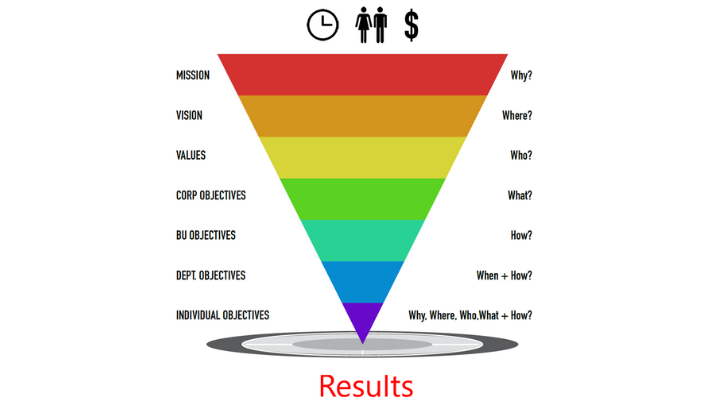
The Accountability Funnel
Published in AccountabilityWhere’s Your Accountability Chokepoint?
What percentage of the work planned by you and your leaders actually gets done?
Or gets done on time without moving deadlines?
Or gets done right the first time?
My experience leading more than 250 strategic planning sessions and listening to dozens of leaders in private coaching sessions month after month is that even successful organizations are not as effective as they could be at getting things done.
Lack of accountability is a big reason why. Often it’s the reason why.
Accountability is critical to anyone leading a group of people, because, after all, every business is a people business. Accountability is how people get things done—or don’t get things done.
4 Questions Your Plan Must Answer
One of the primary outcomes of a planning session is leadership team alignment.
Only about two out of every ten planning sessions I lead are expected to develop a new path for how an organization will achieve its objectives. For most organizations, the path they’re on is the right path. So alignment – not strategy – is the primary deliverable.
In these instances, the planning session is less about changing a company’s strategy and more about agreeing on the priorities to execute the existing strategy. The session examines and addresses:
- what’s not working and how to fix those issues,
- where to invest more resources in the things and people that are working, and
- how best to innovate and improve proven practices.
The harsh reality is that most businesses fail not because there are not enough ideas but rather because there are too many ideas that cannot be implemented.
In organizations where there are too many ideas and too little agreement on make-or-break priorities, precious hours and limited dollars are squandered on chasing the next shiny object.
Your planning process should get to the heart of answering four fundamental questions:
- What must be done?
- How will it be done?
- When will it be done?
- Who will do it?
Ask yourself if you and your colleagues agree on the answers to these four deceptively simple questions.
My experience suggests that most of your people will fumble the answers.
The Accountability Funnel
All organizations wrestle with accountability in much the same way.
Although the scope and complexity may differ from organization to organization, the problems leaders encounter on their journey toward their objectives are similar.
In my bestselling book Accountability: The Key to Driving a High-Performance Culture, I introduce the concept of the accountability funnel.
Every organization deploys three fundamental resources: time, people, and money. (You may be tempted to include equipment, inventory, or real estate holdings, but these inanimate items are purchased. And while you also may be tempted to argue that people are purchased because you pay them a salary, you don’t own them and they are free to leave anytime they wish.)
Think of your organization as a funnel into which time, talent (people), and treasure (money) are poured.

Emerging from the funnel’s spout is the result of your investment in those three commodities.
The result may be satisfactory or unsatisfactory.
As time, talent and treasure move through your funnel toward a result, their original state is altered as they come into contact with one another.
This contact is shaped by two key contributing factors:
- the processes inside your organization (your belief systems, policies, structure, operating procedures and technical support systems that form the infrastructure of your organization) and,
- the behavior of people comprising teams, departments, remote locations, business units, and outside suppliers (it’s the rare individual who works in solitary confinement even when working remotely).
The sum of this behavior is your organization’s culture.
For some leaders and their organizations, problems start at the top of the funnel. Problems arise when there’s not sufficient clarity about the organization’s mission (Why are we here?), the vision (Where are we going?), the core values (Who are we?) and the objectives of the entire enterprise (What are we trying to accomplish?).
Without agreement on the answers to these fundamental matters, every action flowing down through the funnel will require people to solve and re-solve the same or similar problems again and again. You will have created the corporate version of “Groundhog Day.”
As you move down the funnel, you encounter the day-to-day issues of getting things done between departments or within teams. Because there’s not sufficient clarity at the top, emotions can enter into decision-making and influence the results. Emotions can camouflage accountability problems and hinder performance.
“Only three things happen naturally in organizations,” said Peter Drucker. “Friction, confusion and underperformance. Everything else requires leadership.”
Where is your accountability chokepoint? What will you do about it?
Ready to reset?
Attend my free Accountability webinar: I Did It! to set and achieve your 2021 goals.
- February 17th from 11 AM – 12:30 PM Central Time
- My free webinar will help you:
– Sharpen your personal goals
– Improve time management
– Tackle tough work-related issues
– Support remote workers
Learn More
To dive even deeper into the topic of accountability, I invite you to purchase a copy of my bestselling book, “Accountability: The Key to Driving a High-Performance Culture.”
Become a better leader.
Download my three free e-books.
Free Tips
Sign up to receive free tips on business, leadership, and life.
Get My Latest Book
HOW LEADERS DECIDE
History has much to offer today’s current and aspiring leaders.
Business schools teach case studies. Hollywood blockbusters are inspired by true events.
Exceptional leaders are students of history. Decision-making comes with the territory.



